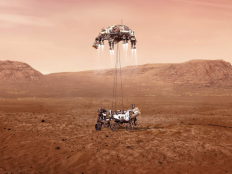All Space Articles
Showing 436 - 450 of 491 results
Curiosity Daily Podcast: Why Asthma Gets Worse at Night, Earth’s Largest Living Thing
Learn about a heroic experiment that helps explain asthma getting worse at night; and the largest living thing on earth.
NASA's Biggest 2021 Milestones
From making history on Mars to supersonic aircraft, NASA continues to astound us with science from this past year.
Curiosity Daily Podcast: Rice TV Screen, Satellite Warfare, Unraveled DNA
Do you want to know about a new environmentally friendly way to make TV Screens, what future space warfare might look like, and how we have finally completely unraveled the human genome?
Will Sending Aliens Nudes Lure Them to Us? NASA Thinks so.
NASA scientists want to send naked pictures of humans to space in hopes of potentially making contact with aliens.
Curiosity Daily Podcast: Water Detected on Mars, A Lost Arizona Goldmine, and Zeigarnik Effect Memory Sharpening
In this podcast, Cody Gough and Ashley Hamer discuss the following stories from Curiosity.com to help you get smarter and learn something new in just a few minutes:
Curiosity Daily Podcast: Why You’d Choose Your Biases Over Money, Coldest Inhabited Place on Earth, and Dark Fluid
Learn about why your biases are so strong, you’d choose them over making money; a new theory that “dark fluid” might mean that dark matter and dark energy are the same weird substance; and Oymyakon, one of the coldest places on Earth where people continuously live.
Curiosity Daily Podcast: Virtual Therapy vs. In-Person Therapy, How Redlining Deepened Segregation in US Cities, and Earth’s Drifting Magnetic Poles
Learn about why you can blame redlining for US cities being so segregated; why Earth’s magnetic north pole is drifting every year; and how virtual therapy can be just as effective as in-person therapy.
Curiosity Daily Podcast: Differences in CEO and Murdering Psychopaths, How Deep Sleep Cleans Your Brain, and the Mystery of Our Inactive Sun
Learn about how our sun is different from similar stars; how deep sleep literally cleans your brain; and the psychology behind why some psychopaths are serial killers, while others are CEOs.
Curiosity Daily Podcast: Prince Rupert’s Drop, Why Earth’s Core Is Younger Than Its Surface, and Newborn Babies May Be Super Smart
Learn why a Prince Rupert’s drop is both super-fragile and virtually unbreakable; why researchers think newborn babies are a lot smarter than they look; and why Earth’s core is younger than its surface.
Launch of SpaceX’s Starlink: A “Mega-Constellation” of Internet Satellites
Starlink is a growing network of satellites capable of providing high-speed internet access across the globe. On August 7 at 1:12 AM EDT, a new batch of satellites will launch from Cape Canaveral, Florida.
Curiosity Daily Podcast: Saturated Fat Could Kill Your Focus, Animals Have Regional Accents, and Rings Around Mars
Learn about how saturated fat can make it harder for you to focus; why it matters that animals have regional accents; and why Mars used to have rings.
Curiosity Daily Podcast: Personalities Associated with Certain Names, Working Less to Save the Earth, and Superbolts
Learn about the big impact we could have on our planet by cutting work hours; the strange behavior of superbolts of lightning; and, which personalities people associate with the sounds of certain names.
Curiosity Daily Podcast: Multitasking Is Impossible, How A Flat Earth Would Even Work, and Nearly Every Country’s Name Origin
Learn how a flat Earth would even work; why multitasking is impossible, and what you should do instead; and the four things that nearly every country on Earth is named after.
Curiosity Daily Podcast: Passion for Your Job Can Backfire, Ancient Greeks Knew Earth Was Round, and Hair in Food
Learn about how the ancient Greeks knew the Earth was round; why being passionate about your job can backfire; and why you shouldn’t worry if you find a hair in your food.
We Might Smell Life Before We See It
It’s a tough game to determine if a distant planet orbiting some nameless star hosts life on it or not. You can’t just walk up to it and start flipping over rocks or poking into the dirt. You can only use your telescopes, and the planets are so extremely distant that you can’t see the surface itself.














